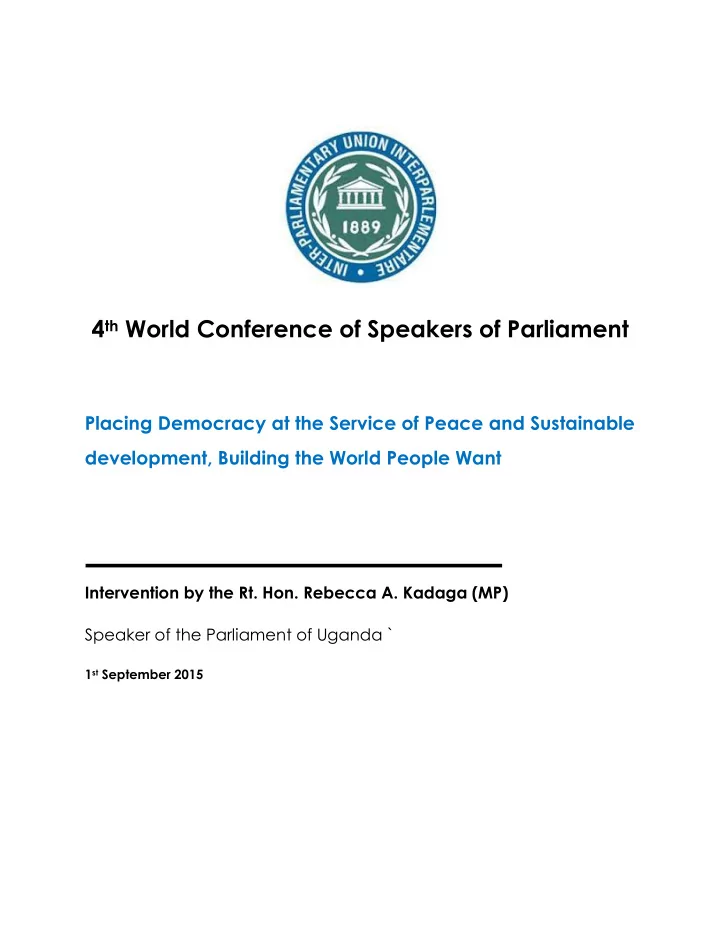

4 th World Conference of Speakers of Parliament Placing Democracy at the Service of Peace and Sustainable development, Building the World People Want Intervention by the Rt. Hon. Rebecca A. Kadaga (MP) Speaker of the Parliament of Uganda ` 1 st September 2015
1. Democratic governance entails political participation exemplified by regular, periodic free and fair elections in which the mandate of the leaders is evaluated, assessed and either endorsed or rejected. It also entails the observance of human rights, access to justice for the people both in the public and economic sphere. It involves the establishment of accessible justice structures including the Courts, the prosecutors and the investigating machinery. 2. Democracy also entails the establishment of equitable education systems to which all citizens have access, an overall improved quality of life, a healthy environment and personal security. On the other hand, the citizens must be informed, engaged and assertive. The state institutions of governance must be inclusive, transparent, accountable and responsive. The main arena for the practice of democracy is within the Parliaments and the Local Governments. It is in the Parliament that the rights, the interests and the stake of the population can be articulated via the representative role of the legislators; it is also the main arena for the budgets that would support the programmes for financing peace and sustaining it. 3. It is the venue to carry out oversight on the work of the Executive; to ensure that the policies, the programmes and the laws are being implemented and that the funds budgeted for are being used for the purpose for which they were allotted. If a Government says it is
engaged in peace keeping, peace building, is it possible to identify the activities that are being carried out? It is also an opportunity to check if indeed a country that is not at war or under threat of war should spend so much on defense expenditure rather than on the social services of the population. 4. Parliaments are increasingly being called upon to influence international events policies and actions. Information sharing between different Parliaments, collaboration on common issues, giving a voice to the voiceless in situations of conflict, instability and hopelessness is another task that we should undertake. Ensuring that international agreements relating to peace cover all the necessary ingredients for the societies affected; in particular ensuring that UN Resolution 1325 with regard to the participation of women in Peace Missions, Peace talks is observed and implemented. 5. Sustainable development requires stability, openness, transparency, and a well-informed population. It requires clear structures and programmes established with timelines accountability systems both within the Government as well within the Legislatures. It is only an elected Government or elected Legislature that can establish the Action Plans, funding of the Action Plans and carrying out oversight by the Legislatures and the Local Governments.
6. It is essential that as part of transparency, accountability and oversight, the Government ought to regularly report to the country through the Legislature on the status of Sustainable Development Goals and Targets. The Parliaments should in order to support the implementation of the goals, establish Committees that specifically examine the funding, availability of the human resources, and monitor Government performance of the Goals and Targets. 7. It is only in a stable democracy that the legislatures can engage in research , in monitoring and in ensuring that the Governments comply with International commitments, in the case of Africa, how many of the Governments have allotted the 10% budgetary allotment for Agriculture as provided for so many years ago in the Maputo Declaration. How many of our countries have either attained or sustained the Comprehensive Africa Agricultural Development Programme (CAAP) which calls for a 6% annual growth in agricultural production, intended to achieve restoration of agricultural growth, food security and rural development in Africa? 8. We are also aware that the African Union declared 2010-2020 the Decade of the African Woman in particular to achieve accelerated reduction of maternal, newborn and child mortality. These can only be monitored and evaluated in a systematic manner. We need research and collaboration with Civil Society and Local Governments to ensure compliance.
9. Today, 58% of the World’s population has access to water but only 31% have access to Sanitation; how are we dealing with the allocation, re-allocation of the budgets to be able to facilitate the provision of this all-important thing called water? 10. If we are able to address basics like Health, Education, Water for life, conservation, we shall have gone a long way in placing democratic practice at the centre of sustainable development and peace.
Recommend
More recommend